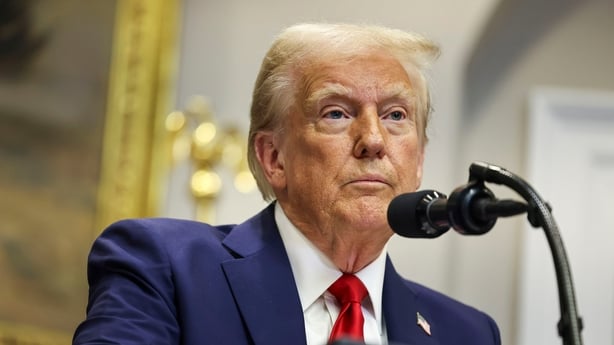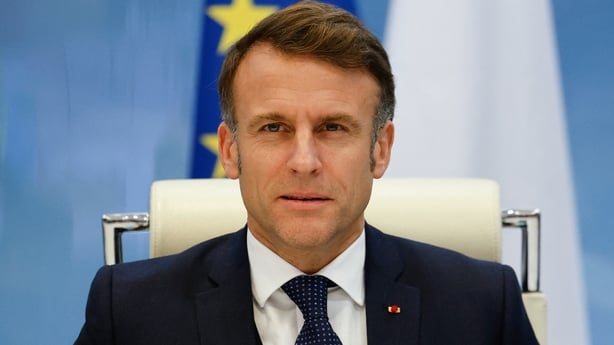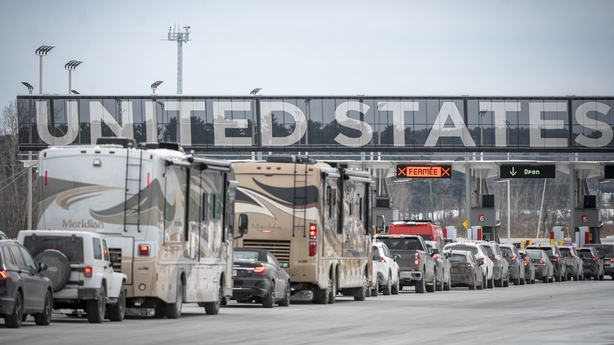US President Donald Trump will pause new tariffs on Mexico for one-month after Mexico agreed to reinforce its northern border with 10,000 National Guard members to stem the flow of illegal drugs, particularly fentanyl, he has said.
Mexican President Claudia Sheinbaum said the agreement also includes a US commitment to act to prevent trafficking of high-powered weapons to Mexico.
The two leaders spoke by phone, just hours before US tariffs on Mexico, China and Canada were set to take effect.
The two counties will use the month-long pause to engage in further negotiations, Mr Trump said on social media.
US tariffs on Canada will also be paused for 30 days, Prime Minister Justin Trudeau said after a call with President Donald Trump in which Mr Trudeau pledged stronger border measures to stop crossings of migrants and illicit drugs.
"I just had a good call with President Trump," he said on X, adding that Canada would deploy nearly 10,000 frontline officers to help secure the border, list drug cartels as terrorists, appoint a "Fentanyl Czar" and crack down on money laundering.

US stocks and other global financial markets slumped on the looming tariffs, while world leaders responded to Mr Trump's threats to expand tariffs to the European Union as well.
The benchmark S&P 500 fell 1.7% at the opening bell, on the heels of the year's biggest daily losses on a string of Asian and European bourses over fears of an economically damaging trade war.
Mr Trump said he had spoken with Canadian Prime Minister Justin Trudeau and would do so again at 3pm ET (8pm Irish time).
Both Canada and previously Mexico had announced retaliatory tariffs of their own.
The tariffs on Canada and China remain poised to take effect tomorrow.
Despite a "good talk" with Canadian Prime Minister Justin Trudeau earlier, Mr Trump said there was still no agreement. The two leaders were due to talk again later.
"Canada is very tough to do business with," said Mr Trump.
He said last-minute talks between Washington and Beijing will likely be held "probably in the next 24 hours" to avoid new tariffs on Chinese imports.
Speaking in Washington yesterday after returning from his Mar-a-Lago estate, Mr Trump indicated that the 27-nation European Union would be next in the firing line, but did not say when.
"They don't take our cars, they don't take our farm products. They take almost nothing and we take everything from them," he told reporters.
EU leaders meeting at an informal summit in Brussels said Europe would be prepared to fight back if the US imposes tariffs, but also called for reason and negotiation.

Arriving at the talks, French President Emmanuel Macron said if the EU were attacked in its commercial interests it would have to "make itself respected and thus react".
Chancellor Olaf Scholz of Germany said the bloc could respond if necessary with its own tariffs against the US, but stressed it was better for the two to find agreement on trade.
Taoiseach Micheál Martin cautioned against any premature response to Mr Trump's threat to impose tariffs on EU exports to the United States, saying that European unity was essential.
Speaking on his arrival to a leaders' meeting in Brussels, Mr Martin said: "First of all, we have to see what happens and assess it and measure it, calibrate the impacts, and then develop our response.
"But I wouldn't do anything prematurely right now, until we see what exactly is being proposed, if something is being proposed."
Mr Trump hinted that Britain, which left the EU in 2020, might be spared tariffs, saying: "I think that one can be worked out".
The US is the EU's largest trade and investment partner.
According to the Eurostat data from 2023, the United States had a deficit of €155.8 billion with the EU in the trade of goods, offset by a surplus of €104 billion in services.
EU foreign policy chief Kaja Kallas said there were no winners in a trade war and if one broke out between Europe and the United States, "then the one laughing on the side is China".

Economists say the Republican president's plan to impose 25% tariffs on Canada and Mexico and 10% tariffs on China would slow global growth and drive prices higher for Americans.
Mr Trump contends they are needed to curb immigration and drugs trafficking and spur domestic industries.
Financial market reaction reflected concerns about the fallout from a trade war.
Shares in Tokyo ended the day down almost 3% and Australia's benchmark - often a proxy trade for Chinese markets - dropped 1.8%.
The mainland China market was shut for Lunar New Year holidays.
Around lunchtime in Europe, Germany's DAX index was down 1.8%, France's CAC down 1.9% and Britain's FTSE 100 down 1.5%.
The Chinese yuan and Canadian dollar slumped against a soaring dollar.
With Canada and Mexico the top sources of US crude oil imports, US oil prices jumped more than 1%, while gasoline futures rose nearly 3%.
Mr Trump's tariffs will cover almost half of all US imports and would require the United States to more than double its own manufacturing output to cover the gap - an unfeasible task in the near term, ING analysts wrote.
Other analysts said the tariffs could throw Canada and Mexico into recession and trigger "stagflation" - high inflation, stagnant growth and elevated unemployment - at home.
In Europe, economists at Deutsche Bank said they were currently factoring in a 0.5% hit to gross domestic product (GDP) should Mr Trump impose 10% tariffs on the bloc.
A White House fact sheet gave no details on what Canada and China would need to do to win a reprieve.
Mr Trump vowed to keep the sanctions in place until what he described as a national emergency over fentanyl, a deadly opioid, and illegal immigration to the United States ends.
China called fentanyl America's problem and said it would challenge the tariffs at the World Trade Organization and take other countermeasures, but also left the door open for talks.
Canada said it would take legal action under the relevant international bodies to challenge the tariffs.
Automakers would be particularly hard hit, with new tariffs on vehicles built in Canada and Mexico, burdening a vast regional supply chain where parts can cross borders several times before final assembly.
Ford and General Motors shares fell between 4% and 5%.
Shares in Volkswagen, BMW, Porsche, Stellantis, and truck maker Daimler Truckall fell by about 5-6% in European trading.
Analysts at investment bank Stifel estimated that €8 billion of VW's revenues would be impacted by tariffs and €16 billion of Stellantis.
